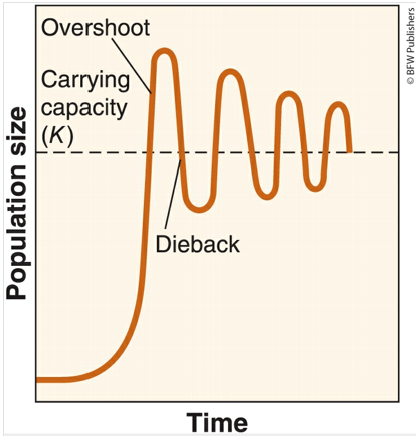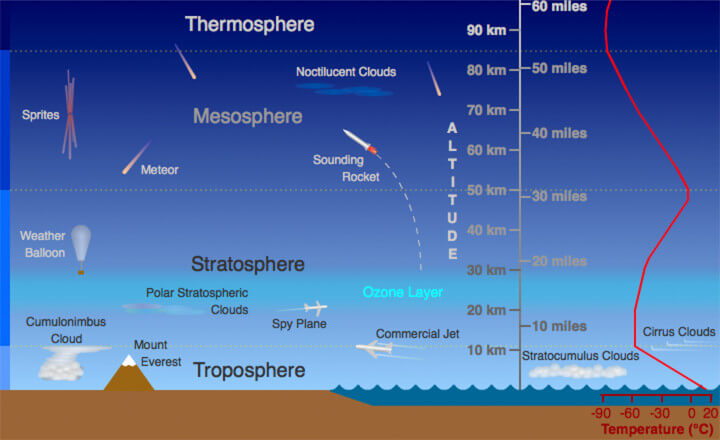Name 2 ways that carbon is released into the atmosphere.
Respiration, combustion, exchange
The actual abiotic conditions under which a species can survive, reproduce, and thrive is known as the realized niche or fundamental niche?
Realized niche
Name two characteristics of K-strategists.
low number of offspring
high parental care
larger
late reproductive maturity
slow growth
What causes summer to be hotter than winter?
Mechanization, synthetic fertilizer, genetically modified organisms
Provide one benefit and one consequence of nuclear energy
Extremely efficient, expensive and dangerous
What are the consequences of ozone and VOCs in the troposphere?
Photochemical smog formation
A population of beavers increased from 2 million to 8 million from 2010 to 2024. What is the growth rate of the population?
10%
What is a major storage for the carbon and nitrogen cycles, but not a major storage for the phosphorus cycle?
Atmosphere
Island A has an area of 500 km2 and is 14 miles from the mainland. Island B has an area of 700 km2 and is 3 miles from the mainland. Which island will have the higher biodiversity AND WHY?
Island B because the theory of island biogeography states that the closer and island is to the mainland and the larger in area, the higher the biodiversity will be bc more animals can survive the migration.
The maximum population that an ecosystem can sustain is known as
carrying capacity
What is the driving force of Earth's wind patterns?
Coriolis effect and Earth's rotation
The tragedy of the commons can be prevented by
regulations, limits, laws etc.
Provide one benefit and one consequence of solar energy.
Minimal waste, ubiquitous
Requires sunlight, expensive, mining for rare metals required
What are the major outdoor air pollutants?
Sulfur dioxide
Particulates
Lead
Ozone
Nitrogen Oxides
Carbon oxides
How much more acidic is a solution with a pH of 7.8 than a solution with a pH of 10.2? (round to the nearest hundredths place)
251.19 times more acidic
How much energy is transferred from one trophic level to the next?
10%
Name two ways that biodiversity is measured AND define each
Species richness: # of species
Species Evenness: ratio of species

What reproductive strategy does the organism demonstrated above employ? How do you know?
r-selected bc the overshot and die-off pattern approaching carrying capacity is distinct to r-strategists.
Name one type of rock and describe how it is formed.
Igneous: cooled magma
Metamorphic: heat and pressure
Sedimentary: compaction
Provide an example of integrated pest management
Intercropping, crop rotation, natural predators/biocontrol
Provide one benefit and one consequence of wind energy
Clean/ no emissions, disruptive to organisms' mating and hunting patterns and noise pollution
SO2 and NOx
A population has a birth rate of 10.4% and a death rate of 3.4%. How long will it take for the population to grow from 10,000 to 40,000?
20 years
Roughly what percentage of incoming solar energy is converted to chemical energy by producers?
1%
A population bottleneck is
a sudden decrease in population size (usually due to hunting or natural disaster)
During the demographic transition, the first rate to drop is (birth/death) because...
death rates due to increased sanitation and healthcare
Which layer of the atmosphere has the highest temperature? 
Thermosphere
Provide one way to reduce urban runoff
rain catchment systems, more soil areas to absorb water
Of oil, coal, and natural gas (fossil fuels), list the CLEANEST and DIRTIEST.
Coal is dirtiest, natural gas is cleanest
What are the major indoor air pollutants?
Carbon monoxide
Radon
Asbestos
Particulates
VOCs
Lead
How many Calories are in 17000 BTU? Round to the nearest hundredths place.
4286.57 Calories
The process by which organisms decompose and release NH4
Ammonification
The main difference between primary and secondary succession is
primary= no soil
secondary= soil is still present
A country with a TFR of 1.8 would be experiencing (growth, decline, stabilization)
growth
 Which soil horizon is likely to have organic material?
Which soil horizon is likely to have organic material?
O and A horizons
The purpose of contour plowing, strip cropping, agroforestry is to
reduce erosion
Provide one benefit and one consequence of subsistence energy production.
CONS: leads to deforestation, not very efficient
PROS: cheap, easy to sustain
Provide a realistic strategy to reducing air pollution OTHER than using clean energy.
Catalytic Converters, Electrostatic precipitators, Coal Scrubbers
An ecosystem's net primary productivity is 17,000 J and 12,000 J are used for respiration. What is the gross primary productivity of the ecosystem?
29,000 J